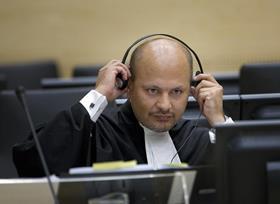War crimes experts have hailed the International Criminal Court’s decision to issue an arrest warrant against President Putin even though the chance to the Russian leader appearing before the Hague court is negligible.
Thomas Garner, partner and specialist extradition lawyer at London firm Fladgate, said: ’The issuance of an arrest warrant by the ICC is symbolically significant for the international community but is unlikely to lead to a prosecution.’ Garner noted that Russia is not a signatory to the 1998 Rome Statute which established the ICC and the court has no jurisdiction to enforce the warrant in Russia. ’Whilst the decision is not meaningless as Moscow have claimed, the ICC lacks the teeth to enforce the warrant unless Putin voluntarily submits to its jurisdiction or travels to a state prepared to arrest him.’
However Sir Geoffrey Nice KC, who led the prosecution in the trial of former Serbian president Slobodan Milosevic, said the warrant would change how world leaders view Putin. ’He will remain an alleged criminal until and unless he submits himself for trial, or is handed over for trial and acquitted. That seems extremely unlikely, so he will remain an alleged criminal until the end of his life,’ he told BBC Radio 4’s Today programme.
Putin is only the third sitting head of state to be indicted by the court, following Slobodan Milosevic of Serbia and Charles Taylor of Liberia. The ICC announced on Friday that he had been indicted along with Maria Lvova-Belova, commissioner for children’s rights in the Office of the President of the Russian Federation.
In a statement, Karim Khan KC, prosecutor of the ICC, said: ’On the basis of evidence collected and analysed by my office pursuant to its independent investigations, the Pre-Trial Chamber has confirmed that there are reasonable grounds to believe that President Putin and Ms Lvova-Belova bear criminal responsibility for the unlawful deportation and transfer of Ukrainian children from occupied areas of Ukraine to the Russian Federation, contrary to article 8(2)(a)(vii) and article 8(2)(b)(viii) of the Rome Statute.

’Incidents identified by my office include the deportation of at least hundreds of children taken from orphanages and children’s care homes. Many of these children, we allege, have since been given for adoption in the Russian Federation. The law was changed in the Russian Federation, through presidential decrees issued by President Putin, to expedite the conferral of Russian citizenship, making it easier for them to be adopted by Russian families.
’My office alleges that these acts, amongst others, demonstrate an intention to permanently remove these children from their own country. At the time of these deportations, the Ukrainian children were protected persons under the Fourth Geneva Convention.’
Khan noted that the deportations ’were carried out in the context of the acts of aggression committed by Russian military forces against the sovereignty and territorial integrity of Ukraine which began in 2014’. He repeated his description of Ukraine as ’a crime scene that encompasses a complex and broad range of alleged international crimes. We will not hesitate to submit further applications for warrants of arrest when the evidence requires us to do so’.












